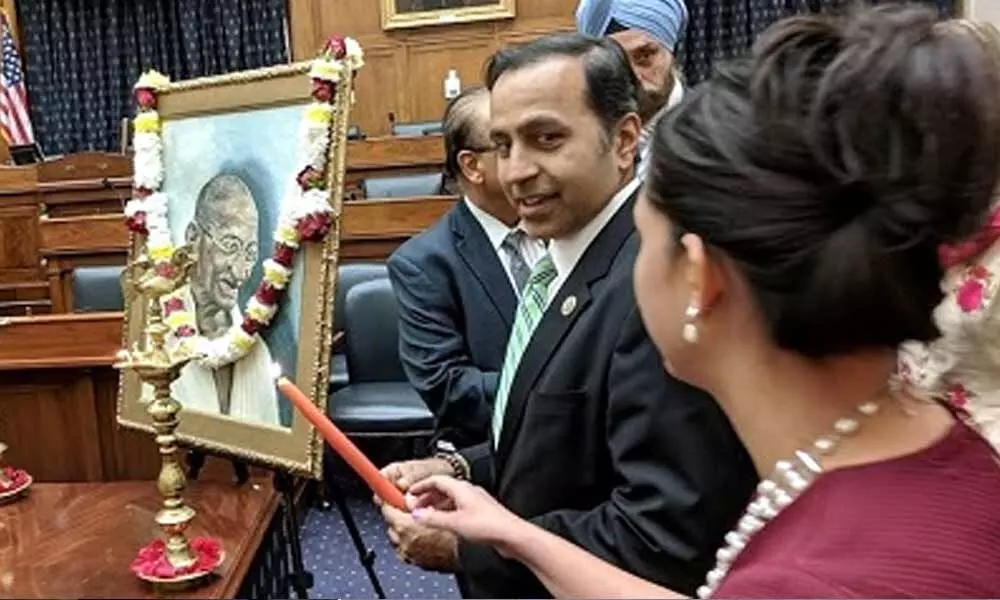US lawmakers pay tributes to Mahatma Gandhi

US lawmakers pay tributes to Mahatma Gandhi (Photo/IANS)
Mahatma Gandhi's life and thoughts inspired people across the globe and "changed the course of human history", US lawmakers have said as they paid glowing tributes to the global peace icon on the occasion of his 151st birth anniversary.
Washington: Mahatma Gandhi's life and thoughts inspired people across the globe and "changed the course of human history", US lawmakers have said as they paid glowing tributes to the global peace icon on the occasion of his 151st birth anniversary. "There are very few human beings that ever walked this far...Mahatma Gandhi is such a man who made a difference not only in India but around the world and it was his leadership, his thoughts, his actions that inspired Dr Martin Luther King," Congressman Gregory Meeks said on Friday. An influential Democratic Congressman from New York, Meeks is a senior member of the House Foreign Affairs Committee and part of the powerful Black Caucus later.
He paid floral tributes at the statue of Mahatma Gandhi at the Gandhi Plaza, in front of the Indian Embassy in downtown Washington DC. Meeks said he knows the influence that Mahatma Gandhi had. Because of him, African-Americans across the US are in places of power, he said. In a video message, Congressman Tom Souzzi said Mahatma Gandhi changed the "course of human history". "So many people were inspired by his actions. But when we think about his life, he had to go through so much. Think of the times that he was beaten, but he was mistreated in prison, his fasting almost to the point of starvation. All of these struggles on a journey to change life in India and change life throughout the world," he said. Congressman Pete Olson said Gandhi was the true visionary for peace. "Gandhi witnessed justice against his fellow countrymen in India, under British rule and chose to change it.
He became the leader of India's nonviolent independence movement to end it British rule once and for forever," he said in his video message that was broadcast during a virtual event hosted by the Indian Embassy here. Gandhiji employed nonviolent resistance to achieve India's independence from Great Britain, said Congressman Ted Yoho. "His philosophy inspired many, including Dr Martin Luther King's peaceful protests that led to our nation's civil rights legislation of the 1960s. His legacy lives on in the hearts and minds of millions around the world in the pursuit of civil rights, peace and understanding," he said. "I think it's important to remember that while Gandhi maintained a steadfast commitment to nonviolent means to achieve change, he never lost sight of the goal of having an India for Indians and working to create a world with less hate violence and oppression," Yoho said. Congressman Brian Fitzpatrick said Gandhi inspired civil rights movements around the world and taught the value of civil disobedience and nonviolent protest.
"Gandhi valiantly fought for religious freedom and encouraged individual and community self-improvement. His work has had a lasting impact on our own nation and our own values. Gandhi believed that the best way to find yourself is to lose yourself in the service of others," he said. Addressing a function at the Indian Embassy here to celebrate Gandhi Jayanti, India's Ambassador to the US, Taranjit Singh Sandhu, said the Mahatma never travelled to the US, but he was deeply influenced by American philosophers Henry David Thoreau and Ralph Waldo Emerson. In a letter to the then US President Franklin Roosevelt in 1942, Gandhiji had said that he "missed twice, coming to your great country". Gandhiji's philosophy has inspired several great Americans, including Martin Luther King and John Lewis, Sandhu said. King, who visited India in 1959, in a public radio address had said that Gandhiji's principles are "as inescapable as the law of gravitation". "As India's Ambassador to the US, let me tell you, Gandhiji's influence is not limited to one country, one region, or one generation. Gandhiji belongs to the world; he belongs to all of humanity. Gandhiji's teachings, transcend time.
They are as relevant today, as they were a century ago, and they will remain relevant, centuries hence," Sandhu said. In 1998, Sandhu was part of the team in Washington DC, when the US Congress authorised the Government of India to establish a Gandhi memorial on a federal piece of land in the District of Columbia. "The Mahatma Gandhi Memorial that stands tall in front of the Indian Embassy today is a testimony to the ideals that India and the US share; the values, that we cherish," Sandhu said.
"The Gandhi King Bill, that is currently in the US Congress, is another reflection of this enduring legacy. We are also fortunate to have many Congressmen join us today, sharing their experiences, regarding how Mahatma Gandhi has influenced each of them profoundly and the country as a whole," he said. During the event, 17 lawmakers from across the US delivered messages on the importance of Mahatma Gandhi's life. The event was organised to mark the conclusion of the two-year-long Gandhi@150 celebrations. The event also featured a message from Srimati Karuna, Director of the Gandhi Centre in DC, and special performances from various artists in the US and India. On October 1, the Embassy held a virtual Gandhi Katha session (narration of stories of Mahatma Gandhi) with Dr Shobhana Radhakrishna that saw a participation of over 9,000 people.








